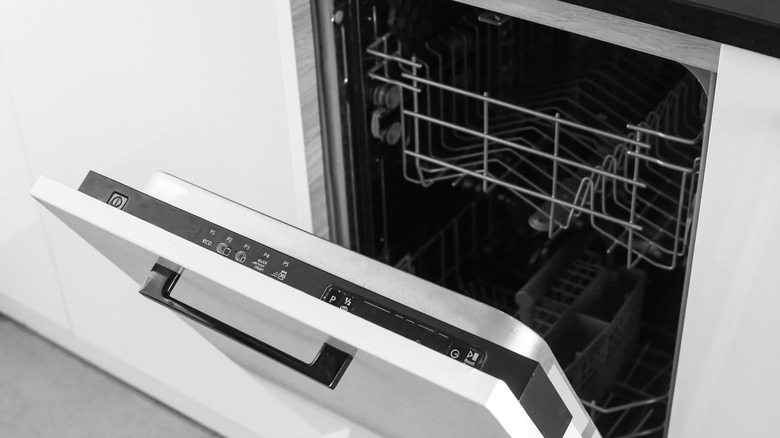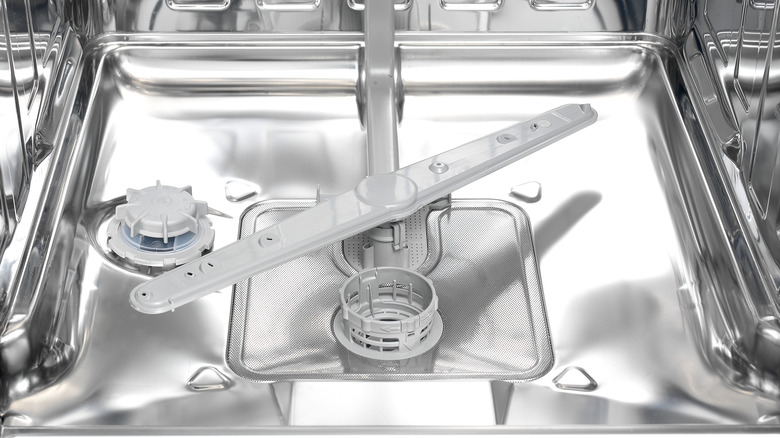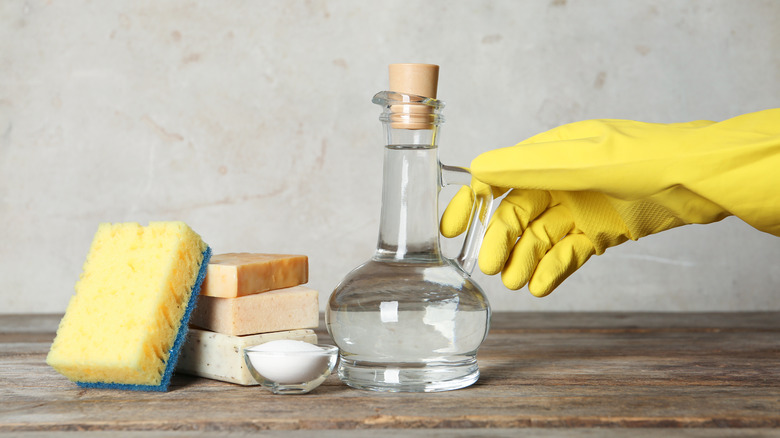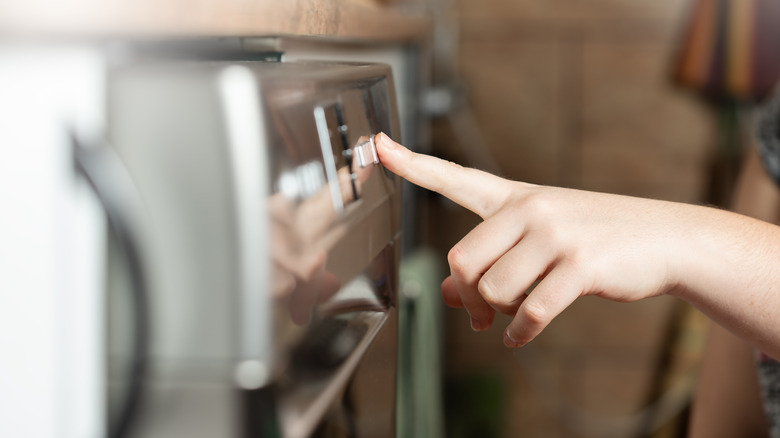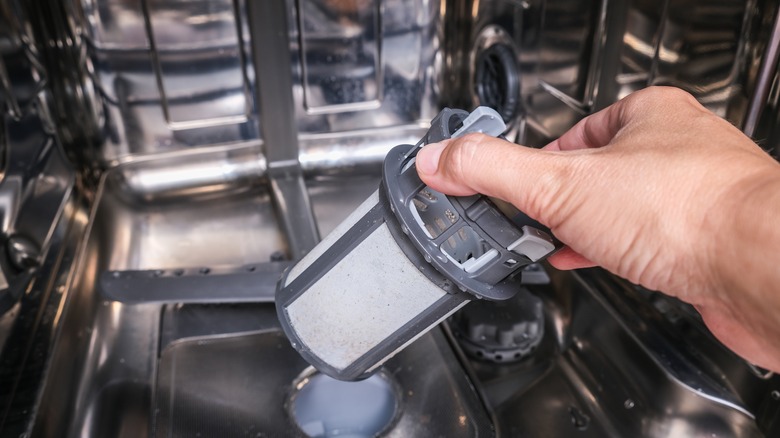How To Properly Clean Your Dishwasher, According To An Expert
For anyone who has a dishwasher in their home, it becomes an indispensable part of their routine. Loading and unloading is likely a daily chore, so you have clean dishes, glasses, and cutlery to use whenever you need them.
Since the dishwasher is constantly running cycles with hot water and detergent, you might think the interior doesn't need any cleaning. After all, it gets cleaned every time you run a cycle, right? Well, not exactly. As Susan's Green Cleaning explains, that heat and moisture can actually create the perfect environment for mold and bacteria to grow. In fact, a study in Fungal Biology examining 189 dishwashers from various countries reported that approximately 62% of the analyzed dishwashers tested positive for fungi.
For those who want to rest assured that their dishes are truly clean after a cycle and that no nasty bacteria or fungus is lurking in the depths of their dishwasher, a little more effort is needed. Now, you don't have to do a full deep clean every time to run a load of dishes — however, there are a few steps you'll want to take on a semi-regular basis to ensure your dishwasher is running properly and staying clean.
In an exclusive interview with House Digest, Hugo Guerrero, certified House Cleaning Technician (HCT) and consultant for Mattressive, gave us the scoop on how exactly to get your dishwasher sparkling clean.
Spot clean the inside of the dishwasher
Once you're finished putting away a load of dishes, you might assume your job is done and simply shut the dishwasher, moving on to the next thing on your list. However, you should regularly check the dishwasher's interior to ensure there aren't any unwanted food particles lingering that could end up breeding nasty bacteria or fungus.
"Remove any large debris or food particles from the bottom of the dishwasher. You can do this by using a flashlight to inspect the bottom and then using a toothbrush or a small scrub brush to remove any stuck-on bits," Hugo Guerrero advises.
While this may seem like an unnecessary chore if you're a pro rinser and only occasionally find anything, trust us — it's much easier to manage the odd piece of debris here or there than to do an arduous deep clean when you finally realize the bottom of your dishwasher has become disgusting.
And don't neglect the exterior, either. "Clean the exterior of the dishwasher with a mild detergent and a damp cloth," Guerrero recommends. Since many wipe down their counters daily, simply extending that process and wiping down your dishwasher as well takes mere seconds and will ensure it's always clean.
Use dishwasher cleaner
Yes, you use some type of detergent to clean your dishes, glassware, and cutlery. However, those detergents are designed to clean your dishes themselves. You also need to use a cleaner that specifically targets all the potentially nasty things that could grow within your dishwasher. And luckily, there are plenty of options depending on whether you'd prefer to buy something from the store or make a solution yourself.
"Run a cycle with a dishwasher cleaner," says Hugo Guerrero. "You can purchase a commercial dishwasher cleaner or use a homemade solution of white vinegar and baking soda." If the latter sounds preferable, Guerrero advises to "Simply add a cup of vinegar and a cup of baking soda to the dishwasher and run a hot water cycle."
After that cycle is completed, there's just one more easy step that Guerrero recommends. "Use a microfiber cloth to wipe down the inside of the dishwasher, including the door seal, the gasket, and the spray arm." Not only will this make sure there's no residue from whatever cleaner you used, but it'll also help you really deep clean some of the little nooks and crannies where bacteria and fungus tend to grow.
Run a monthly maintenance cycle
You're likely washing your dishes every day (or maybe every second day if you're in a smaller household and don't produce as many), but you certainly don't need to deep clean your dishwasher every single day. Not only would that be time-consuming, but it would also use up a ton of water. However, Hugo Guerrero does recommend doing a monthly maintenance cycle to ensure everything is running correctly and that your dishwasher is as clean as possible.
"Once a month, you can also run a cycle with a cup of white vinegar to help remove any built-up grime or hard water deposits," he suggests. This is especially important if you know you live in an area with hard water.
In addition to checking for any food particles or debris in your dishwasher, you'll also want to use your sense of smell to sniff out if something isn't as clean as you thought and address the issue with the proper products.
"If you notice any unpleasant odors coming from the dishwasher, you can place a bowl of white vinegar in the top rack and run a hot water cycle to help remove the odor," adds Guerrero. That's right — a simple, inexpensive container of white vinegar will do wonders in helping keep your dishwasher sparkling clean and smelling fresh.
Tend to the filters
If you've been diligently checking the dishwasher's interior for any debris or food particles that may have been lingering after a few wash cycles, and you've been doing regular maintenance with vinegar to freshen things up but still notice a funky aroma that you just can't explain — chances are, it may be something in your filters. That's why it's important not to neglect that particular component of your dishwasher, even if they're not immediately visible.
"Be sure to keep the dishwasher's filters clean," Hugo Guerrero says. "These can usually be found at the bottom of the dishwasher and can be removed and rinsed with water to remove any accumulated food particles."
Yes, it'll take an extra minute or two to clean that particular part, and it might require a bit of trial and error to figure out how to remove it the first time you attempt the task; however, it'll make a huge difference. After all, why bother keeping the interior of your dishwasher squeaky clean if your filter is a mess? For the best results (and the cleanest possible dishware), you want to make sure you're properly attending to every component within your dishwasher that you can access.
